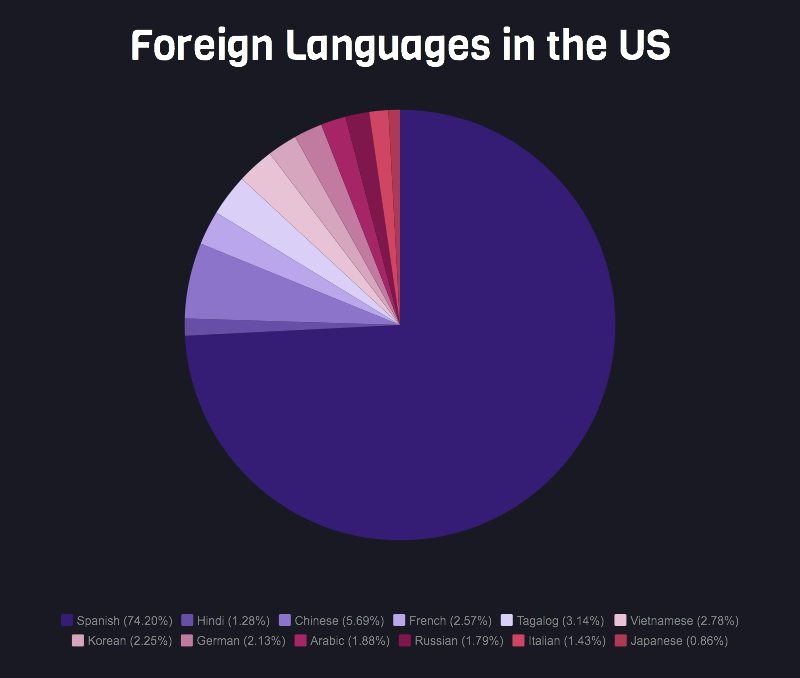The benefits of being bilingual
December 3, 2016
Speaking more than one language has its social benefits, including broader communication and better understanding of a country’s culture.
Often times, people who speak a foreign language find it easier to communicate and relate to people who speak the same foreign language. Knowing two languages can also increase the number of people an individual can communicate with and expand their knowledge of a country’s culture.
“I feel like it’s really good to know more than one language. It expands your view and it allows you to communicate with more people and it makes learning another language easier,” Aditi Ghalsasi (9), who speaks Marathi and Hindi in addition to English, said.
The benefits of speaking another language, however, is not restricted to social communication. Bilingualism also has several biological benefits. Recent research conducted by researchers and psychologists has found that conversing in more than one language can also provide benefits to a person’s mental abilities and increase their cognitive intellect.
In 2004, a group of researchers led by Andrea Mechelli of London’s Wellcome Department of Imaging Neuroscience, collaborating with the Fondazione Santa Lucia in Rome, conducted a study analyzing the brain densities of bilinguals. The study found that bilinguals were more proficient in the areas of language, memory and attention than their monolingual counterparts, as well as being able to excel in mentally demanding tasks in general.
Speaking another language can also be advantageous much later in life. A study conducted on 44 elderly Spanish-English bilinguals by neuropsychologist Tamar Gollan of the University of California, San Diego, in 2012 found that people with a higher proficiency in two languages are less likely to develop an early onset of diseases such as dementia and Alzheimer’s.
“I just read an article recently about some research out there that says that people who are bilingual, [their] brain is so active [while] moving from one language to another that when [they] age, they don’t have [many] memory problems,” Spanish teacher Isabel Garcia said. “My mother has two cousins here, who are much older than her… bilingual, both of them, and [they have an] excellent memory. They can recall an experience that happened 50 years ago.”
Other benefits of being bilingual include greater social ability. A study by psychologists Boaz Keysar, Zoe Liberman and Samantha Fan at the University of Chicago in 2015 tested children in an experiment which required them to take a speaker’s perspective into account when asked to complete certain tasks. The monolingual children correctly completed the intended tasks nearly 50 percent of the time and the bilingual children 77 percent of the time. The results therefore determined that bilingual children were better than monolingual children at communicating and interpreting a speaker’s intention.
Despite there being a multitude of cultures and languages that exist in America, only 58 percent of U.S. middle schools and 25 percent of elementary schools promote foreign language courses.
“English is mandatory in Japan; everyone learns English when they get to middle school. In some schools now, English is actually taught at elementary schools. Younger kids just learn languages through fun activities,” Japanese teacher Yumiko Aridomi said.
The United States Census Bureau conducted a study in 2009, which showed that around 20 percent of Americans could converse in a language other than English. Around 56 percent of Europeans, as determined by the European Commission in 2006, are multilingual.
Speaking one language instead of two, as mentioned before, can be advantageous in the areas of social communication and understanding of a culture. Knowing another language also creates many job opportunities for society, but also provides an individual with heightened intellect and greater social acuity.


















![“[Building nerf blasters] became this outlet of creativity for me that hasn't been matched by anything else. The process [of] making a build complete to your desire is such a painstakingly difficult process, but I've had to learn from [the skills needed from] soldering to proper painting. There's so many different options for everything, if you think about it, it exists. The best part is [that] if it doesn't exist, you can build it yourself," Ishaan Parate said.](https://harkeraquila.com/wp-content/uploads/2022/08/DSC_8149-900x604.jpg)




![“When I came into high school, I was ready to be a follower. But DECA was a game changer for me. It helped me overcome my fear of public speaking, and it's played such a major role in who I've become today. To be able to successfully lead a chapter of 150 students, an officer team and be one of the upperclassmen I once really admired is something I'm [really] proud of,” Anvitha Tummala ('21) said.](https://harkeraquila.com/wp-content/uploads/2021/07/Screen-Shot-2021-07-25-at-9.50.05-AM-900x594.png)







![“I think getting up in the morning and having a sense of purpose [is exciting]. I think without a certain amount of drive, life is kind of obsolete and mundane, and I think having that every single day is what makes each day unique and kind of makes life exciting,” Neymika Jain (12) said.](https://harkeraquila.com/wp-content/uploads/2017/06/Screen-Shot-2017-06-03-at-4.54.16-PM.png)








![“My slogan is ‘slow feet, don’t eat, and I’m hungry.’ You need to run fast to get where you are–you aren't going to get those championships if you aren't fast,” Angel Cervantes (12) said. “I want to do well in school on my tests and in track and win championships for my team. I live by that, [and] I can do that anywhere: in the classroom or on the field.”](https://harkeraquila.com/wp-content/uploads/2018/06/DSC5146-900x601.jpg)
![“[Volleyball has] taught me how to fall correctly, and another thing it taught is that you don’t have to be the best at something to be good at it. If you just hit the ball in a smart way, then it still scores points and you’re good at it. You could be a background player and still make a much bigger impact on the team than you would think,” Anya Gert (’20) said.](https://harkeraquila.com/wp-content/uploads/2020/06/AnnaGert_JinTuan_HoHPhotoEdited-600x900.jpeg)

![“I'm not nearly there yet, but [my confidence has] definitely been getting better since I was pretty shy and timid coming into Harker my freshman year. I know that there's a lot of people that are really confident in what they do, and I really admire them. Everyone's so driven and that has really pushed me to kind of try to find my own place in high school and be more confident,” Alyssa Huang (’20) said.](https://harkeraquila.com/wp-content/uploads/2020/06/AlyssaHuang_EmilyChen_HoHPhoto-900x749.jpeg)







